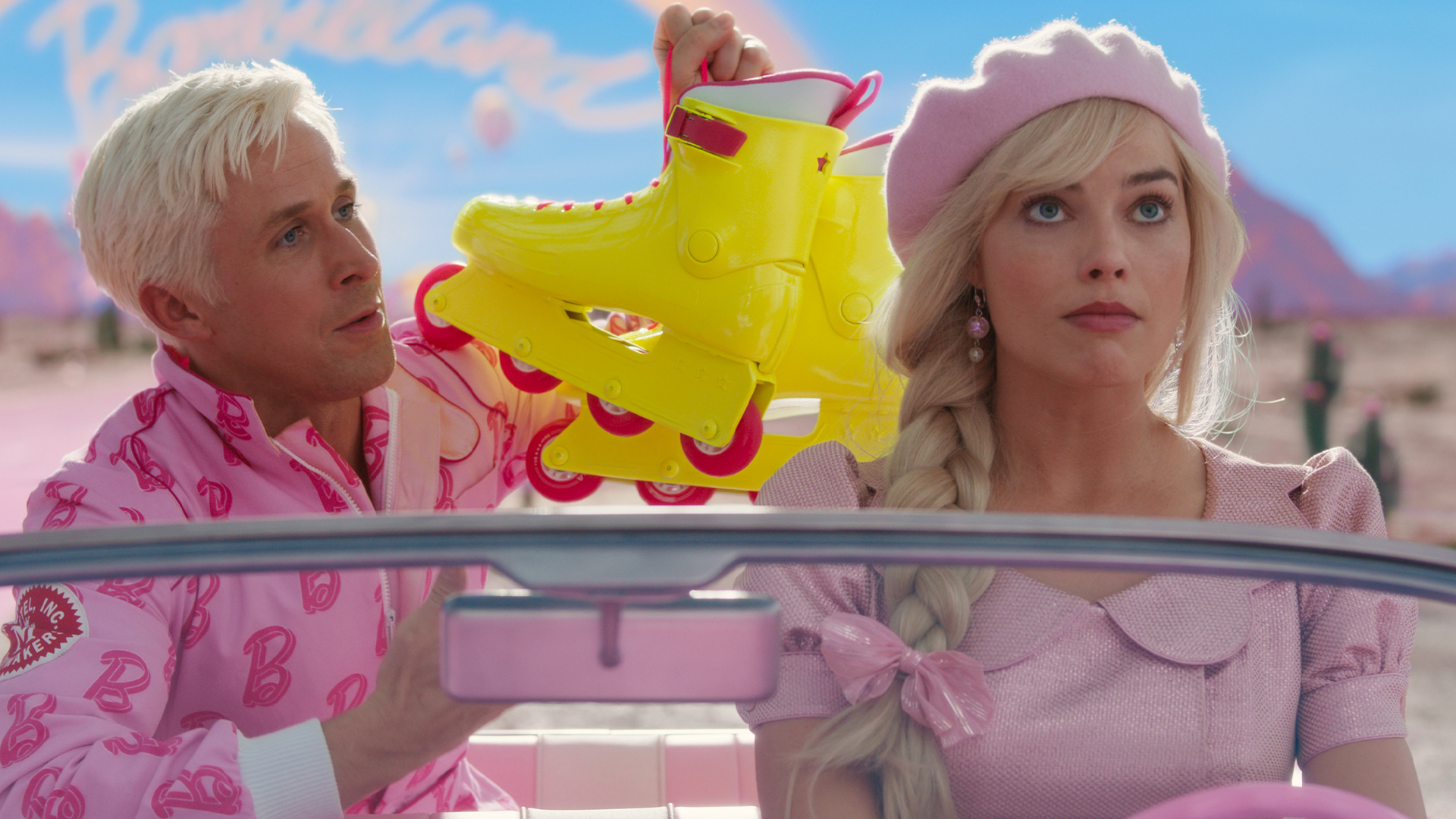For better or worse, 2023 feels like the year of Corporate Asset Cinema

2023 really seems to be the year of the Product Movie. While they’re not always painful, Rory Doherty considers what’s driving corporations to push so hard into multiplexes.
The theme of Hollywood has been corporations for a long time, but it feels like in 2023, movies and the people making them are saying the quiet part out loud. Not only are workers rejecting the punishing conditions and treatment studios push on them, but we’re seeing corporate identities increasingly bleed into big, buzzy films in cinemas and on streaming. We’re long past looking at something like Disney’s Haunted Mansion and thinking, “A movie based on a theme park ride? Whatever will they think of next!” We need to pull up Hollywood’s receipts to work out why so many new films feel like they were made for accounting spreadsheets.
By now, we’re all aware (and slightly weirded out) by the amount of “Product Movies” 2023 has given us where, instead of a trailblazing genius inventor taking center-stage, their invention is the focus. There’s Air (the story of Air Jordans), Tetris (the story of acquiring the international rights to the block-based video game), The Beanie Bubble (the story of the intense speculation culture surrounding plush Beanie Babies in the 90s), and Flamin’ Hot (the story of… Cheetos).
Some of these films lionise a product still on the shelves, whose brand benefits from its origin story being engraved into cultural consciousness. Others, like The Beanie Bubble or the upcoming BlackBerry (the story of the first smartphone) benefit from taking a more critical approach to the ups and downs of a business no longer thriving; when you tell the story of a defunct phone, you don’t have to worry about their lawyers telling you how their product can and cannot be depicted.
This seems like the inevitable endpoint to Wall Street investing big in streaming a decade ago, and it’s no coincidence most of these Product Movies can be found on major streaming networks. But this is a clear-cut example of corporations bigging themselves up in entertainment; what about all the murkier examples of non-narrative IPs being expanded into blockbuster events?
Haunted Mansion comes on hot on the pink heels of megahit Barbie, and earlier this year we got adaptations of iconic games that don’t have a singular, iconic narrative with Dungeons & Dragons and the Super Mario Bros. Movie. In all four, it’s not just a story that has to be invented, but the personalities, motivations, and identities of all the characters. All that exists are the vague, flexible parameters of tone, setting, and the most base-level, broad-appeal characters—only the ones audiences will recognise on-screen.
No longer are comic books, books, or animated shows the preferred prime real estate for big-screen adaptations, but games, toys, and rides that everyone associates with fun devoid of story, where everyone’s interest is piqued at the prospect of seeing on-screen something invested so deep in the cultural psyche. Stories? They’re old news. Things? Things last forever.
The problem with these films, which all plainly stamp the company names “Mattel”, “Hasbro”, “Nintendo” in the opening credits, is that it’s hard to tell a genuinely meaningful original story if the main priority is to sell products. All of these properties are defined by how they are played with, by a cooperative experience shared by people getting something immediate and personal out of a game, ride, or toy. How do you make a film, which must appeal to as many as possible, that could recreate that tailored, interactive feeling? No matter how lovingly these films are crafted, something is being lost in prescribing them to a single narrative.
These companies are shrewd; all of them disguise their advertisements by leaning more into the innocent, uncomplicated joy kids feel when using their product, attempting to replicate the experience associated with their products. But this is always hampered if this subversive commentary comes from those with a vested interest in receiving your money.
It’s not always as simple as watching a film and being motivated to buy a toy, or a game, or a ticket to a theme park. Movies are still the best ways to gain cultural legitimacy, and properties as old as Barbie and “The Haunted Mansion” benefit from audiences thinking their brand is still viable and relevant, while also being able to poke fun at itself (not too much, though).
This isn’t always painful! Barbie and D&D do this admirably, and result in a swell time at the movies—even Haunted Mansion’s modest goals remind us how charming kiddified spookiness can be, especially in Disney’s hands.
But Disney doesn’t stop at bolstering its narrative-free assets, their beloved animated canon is getting the same treatment. Classics like Peter Pan and The Little Mermaid just aren’t profitable enough collecting dust on their streaming service, they need to be upgraded to create a new revenue stream. In a year where things—not characters or actors—we recognise are ruling the box office and our streaming services, we’d all benefit from thinking a little harder about who benefits most from these corporately approved stories.


















